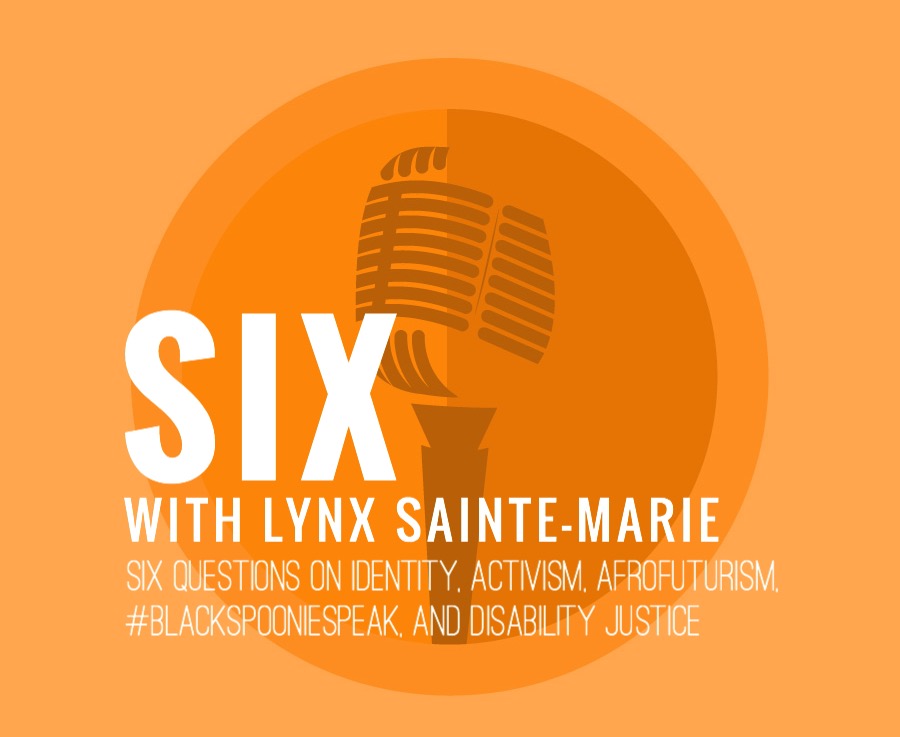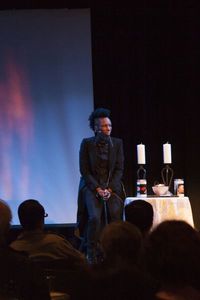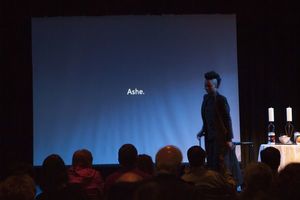Six With Lynx Sainte-Marie
By Jael Richardson
Six questions on identity, activism, Afrofuturism, #BlackSpoonieSpeak, and disability justice with Poet and Activist Lynx Sainte-Marie.
ONE
As writers, our names and our bios are how we’re introduced to the world. Part of your bio reads (full bio posted below): “Lynx Sainte-Marie, Afro+Goth Poet, is a multimedium artist, activist, educator of the Jamaican diaspora, with ancestral roots indigenous to Africa and the British Isles. A disabled/chronically ill, non-binary/genderfluid person, they currently reside in what’s commonly known as the Greater Toronto Area, stolen land of the Anishinaabe, Haudenosaunee, Huron-Wendat, Mississaugas of New Credit, Petun and Seneca peoples. They identify within queer and trans, femme, boi, gender non-conforming, crip and spoonie communities, as well as a survivor of abuse and intergenerational trauma.”
How did you decide on your bio and how well does it reflect who you are?
Lynx Sainte-Marie
My bio has definitely shifted and changed over the past few years with the more I travel and learn. But the one thing that tends to stay the same is letting people know my positionality: the lens by which I see the world and the lens by which the world sees me. I state these parts of my being because my body’s relationship to this land and the places and systems that reside therein is a complex one. A person whose African ancestors were stolen who lives and works on stolen land. A person who is queer and fluid of gender, a gender not of the white cisheteropatriarchal gender binary. A person whose body is disabled by society. This person, who takes all of these intersecting identities and embodied knowledges, using it to support the liberation and healing of their communities in whatever ways they can. That’s me. Of course, not all of me. But I’m comfortable with our journey together starting there.
TWO
There are so many ways to engage with the arts or to engage in activism. Why did you choose writing?
Lynx Sainte-Marie
I’ve always been writing, for as long as I’ve known myself. I’ve been writing for longer than I have considered myself a poet. My community work began once I started to see myself in context to these words; when I realized that I didn’t need a co-sign from some publishing agency or a university in the form of a MFA to consider myself a creative. I often speak about how these words were co-opted by capitalism and white supremacy to take away from Black, Indigenous, People of Colour (BIPOC) a knowledge we have always known and at times seem to forget about ourselves, that we are storytellers. It’s our birthright. As a marginalized person, you have to be creative and resourceful to survive on the margins. And as Black people, we got the bass line in our heartbeats. So it made sense that when I started my activism, art and writing would be a necessary part of my community building.
THREE
How does the concept of Afrofuturism influence your writing?
Lynx Sainte-Marie
Afrofuturism is everything: music; art; storytelling; organizing; activating; cultural working; resistance. It is a movement that takes Blackness and positions it in the stars, (re)creating, (re)mixing and (re)en|visioning Black history and Black people in the future. When I think of Afrofuturism, I think of the collective consciousness we share as Black folks. The Black Radical Imagination. The interconnected plane of thought and knowledge where Black people birth whole worlds for ourselves. A (re)imagining of our communities, histories and bodies outside of colonial, white supremacist narratives. And though I don’t always create work that can be labelled as Afrofuturistic, I like to dream dreams of my present self as future ancestor. I feel that creating from this place supports my survival and keeps me accountable to the future generations of Black young ones who might one day invoke me the way I invoke my own Black ascendants.
FOUR
Last year, you launched #BlackSpoonieSpeak, a creative workshop series for disabled/chronically ill Black youth. Why did you decide to organize it and what did you learn from the process?
Lynx Sainte-Marie
As someone who is invested in disability justice not only as a framework for organizing but as a way for us to acknowledge each other and meet each other where we’re at as multi-issue people, I started #BlackSpoonieSpeak as a way for Black youth to come together and be true to their story, whatever it may look like. I wanted it to be a soft, low stimulation place where we could focus on our relationships to art as well as the complicated relationships we have with ourselves. As facilitators, our job is to hold a space together – physically; emotionally; spiritually – in order for participants to bring their whole, authentic selves to the writing. And we do that by recognizing that our participants already have the tools to express themselves and sometimes they just need encouragement and the acknowledgement that they are “doing it right”. We spoke a lot about Imposter Syndrome during our sessions and it’s amazing the sort of anti-Black narratives our bodies ingest and nurture inside ourselves as truth. As a facilitator, I am here to remind Black youth that they are the descendants of a long line of genius poets, authors, and magic-makers. The writing lives within us.
Your CanLit News
Subscribe to Open Book’s newsletter to get local book events, literary content, writing tips, and more in your inbox
FIVE
What’s next for #BlackSpoonieSpeak?
Lynx Sainte-Marie
If money and capacity permits, I would love to curate an event of sorts for #BlackSpoonieSpeak. Check in with me again next year and maybe I’ll have more to say about that.
SIX
As marginalized people, there are certain ways stories are told about us. There are certain questions that are asked and not asked. What is a question you wish people asked you more often, and how would you answer it?
Lynx Sainte-Marie
I wish more people would ask what support looks like for Black artists, especially those of us who are sick and disabled. There’s a paradox that comes with oppression – a hypervisibility and simultaneous erasure faced by people who experience multiple cites of oppression. An example of this is how anti-Blackness perverts the Black body into one that always seems “strong”, one that feels less pain and doesn’t need as much care as white bodies. At the same time, disabled/chronically ill people are often told what they need, and that their bodies need to be regulated, spoken for, monitored closely or fixed. I experience both of these seemingly contradicting narratives every day. And when these oppressive narrative go unchallenged in the world, people with these intersections experience a lack of care or patronizing acts of support. And that’s a problem. We need to be supporting the work, art and lives of Black artists. We need to be asking BIPOC artists and activists how we can support them in ways that are sustainable, that honour their self-determination and contribute to their healing. We need to be prioritizing the care of artists and activists at the intersection, not only when it is convenient for us. The same people who shout Black Lives Matter in the streets unfortunately might not be the same people who are supporting their Black artist friends in tangible, practical ways. I want people to ask me and other marginalized, racialized artists like myself, what we need not only to get paid but to get free.
Lynx Sainte-Marie, Afro+Goth Poet, is a multimedium artist, activist, educator of the Jamaican diaspora, with ancestral roots indigenous to Africa and the British Isles. A disabled/chronically ill, non-binary/genderfluid person, they currently reside in what’s commonly known as the Greater Toronto Area, stolen land of the Anishinaabe, Haudenosaunee, Huron-Wendat, Mississaugas of New Credit, Petun and Seneca peoples. They identify within queer and trans, femme, boi, gender non-conforming, crip and spoonie communities, as well as a survivor of abuse and intergenerational trauma.
A poet across mediums, Lynx utilizes multiple art forms – writing, performance, visual art, storytelling, multimedia art installation and song – to engage audiences around issues of identity, oppression, liberation, resiliency and survival at the intersection. Their writing has appeared in Black Girl Dangerous, OCHUN: Watah Poetry Anthology Book I, Plenitude Magazine, and The Deaf Poets Society. They have exhibited and performed in various art and event spaces including the Harbourfront Centre, the Canadian Lesbian and Gay Archives, Nuit Blanche Toronto, Montréal, arts interculturels (MAI), the Art Gallery of Ontario and the George Paton Gallery in Melbourne, Australia. A recipient of a Toronto Arts Council Platform-A micro-grant through Arts Starts, They created and co-facilitated #BlackSpoonieSpeak, a creative writing workshop series for Black disabled/chronically ill youth on the margins.
A public speaker and workshop facilitator, Lynx has presented, lectured and served as a keynote speaker at a number of colleges, universities, conferences and symposiums at the national and international level. They are also a consultant who has trained and educated a plethora of individuals and organizations on various issues related to marginalized communities including but not limited to intersectionality, anti-oppression, sexuality, disability and accessibility, gender diversity, anti-Blackness and decolonization.
Lynx’s work is informed by their chosen families, Black feminisms, social justice, disability justice and healing justice movements, and collective community love.
For more information, visit Lynx's website.
The views expressed by Open Book columnists are those held by the authors and do not necessarily reflect the views of Open Book.
Jael Richardson is the author of The Stone Thrower: A Daughter's Lessons, a Father's Life, a memoir based on her relationship with her father, CFL quarterback Chuck Ealey. The book received a CBC Bookie Award and earned Richardson an Acclaim Award and a My People Award as an Emerging Artist. A children's book called The Stone Thrower came out with Groundwood Books in 2016. Her essay "Conception" is part of Room's first Women of Colour edition, and excerpts from her first play, my upside down black face, are published in the anthology T-Dot Griots: An Anthology of Toronto's Black Storytellers. Richardson has an MFA in Creative Writing from the University of Guelph, and she lives in Brampton, Ontario where she serves as the Artistic Director for the Festival of Literary Diversity (The FOLD).




